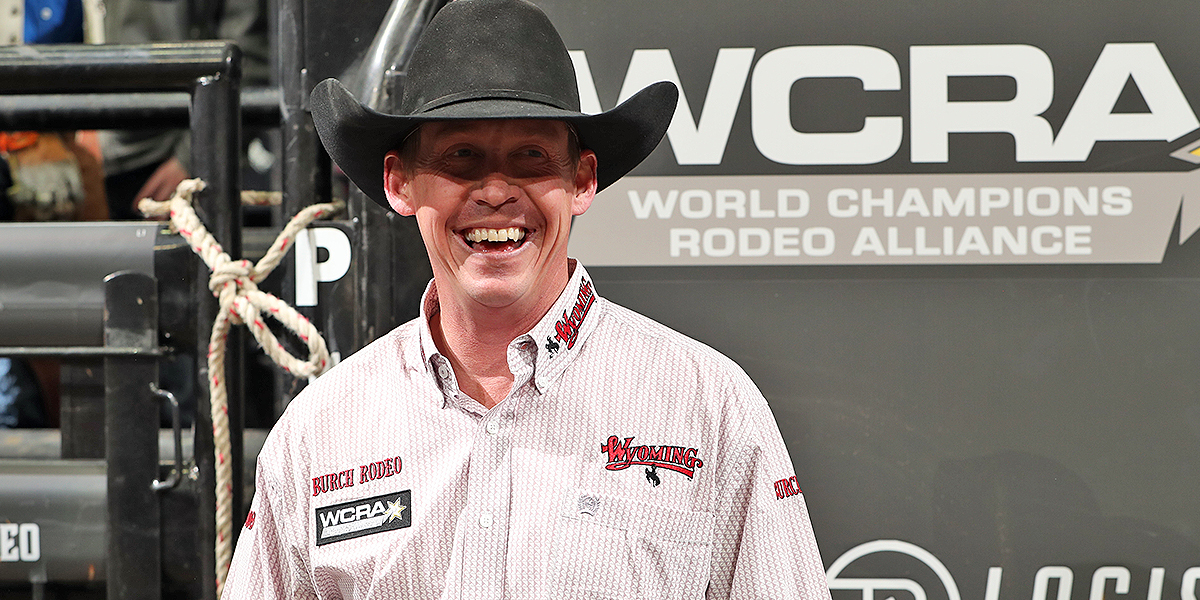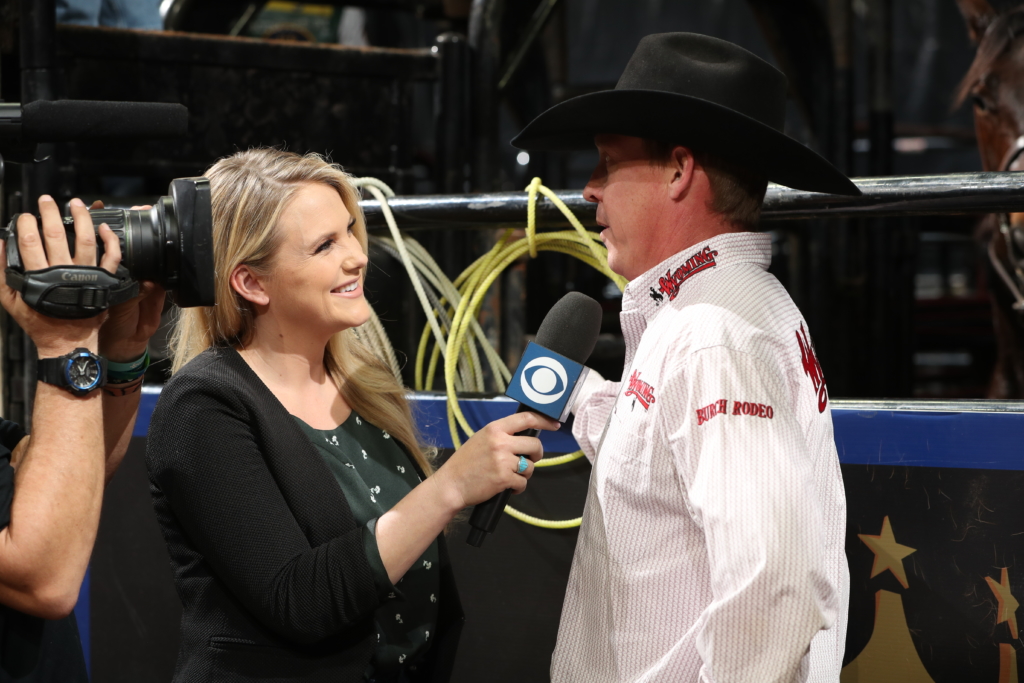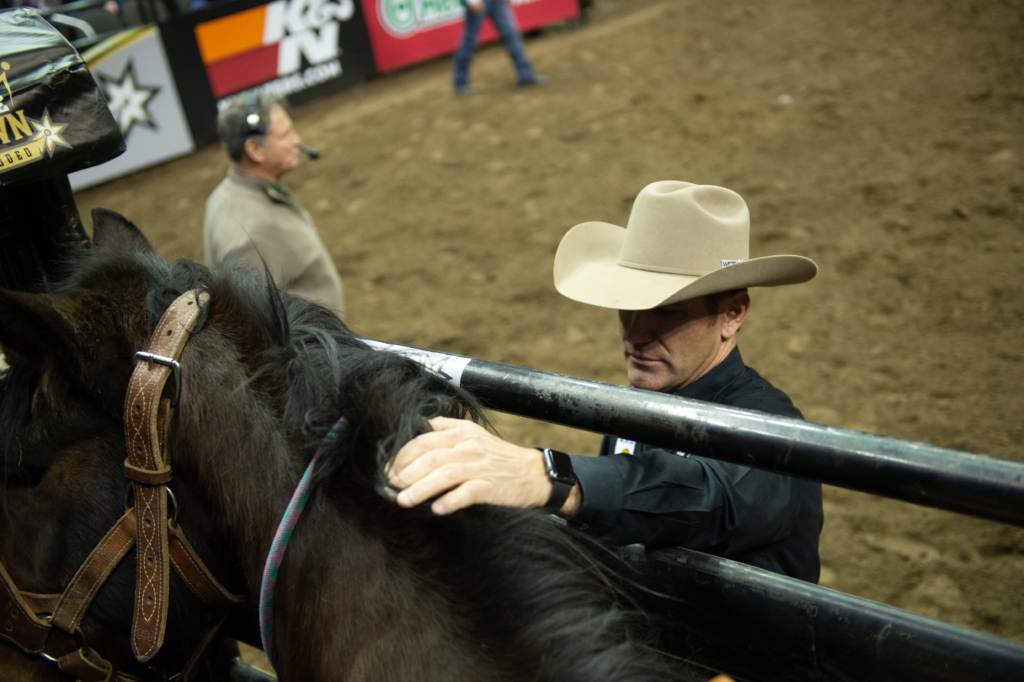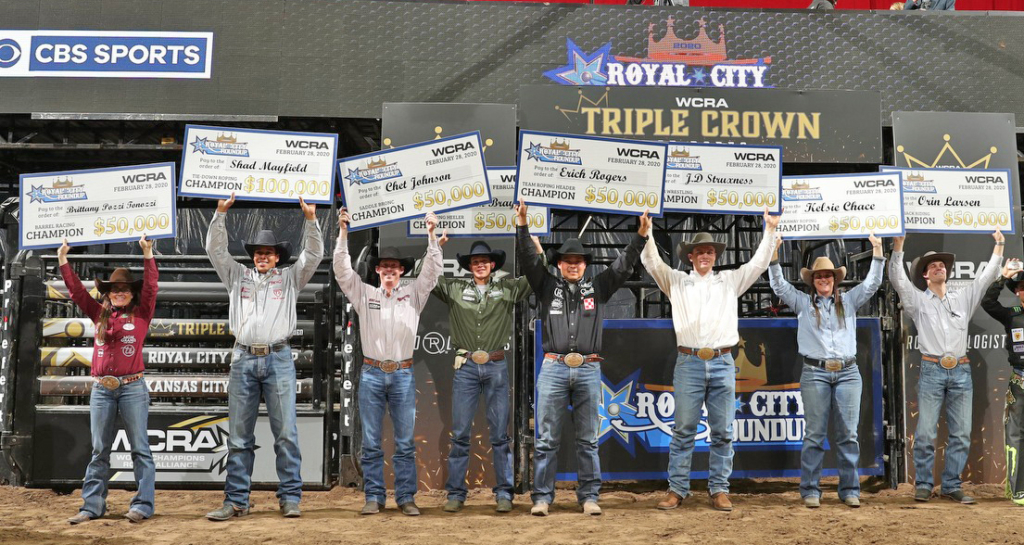
Controversial calls. They’re part of every sport, and at the core of water-cooler conversations coast to coast most Monday mornings. One of everyone’s favorite storylines from last Friday night’s $1 million Royal City Roundup at the Sprint Center in Kansas City was 39-year-old Chet Johnson’s $50,000 saddle bronc riding win aboard reigning Saddle Bronc of the Year Get Smart. The controversy was uncovered by a telling camera angle the next day on prime-time coverage on CBS, a broadcast that pulled major mainstream ratings. In keeping with everything the cowboy owned and operated World Champions Rodeo Alliance stands for, candid conversations followed and policy changes have already been put in place to prevent a repeat of this honest mistake.
To set the stage, Johnson won the nine-man Royal City Roundup long round with 86.5 points on J Bar J’s Big Valley. He then closed the deal with a show-stopping 91.5 points aboard Northcott Macza’s Get Smart. The Kansas City crowd went crazy, as did the cowboy contingent back behind the chutes that included Johnson’s closest competitors, including reserve champ Shorty Garrett. The winning ride was wild, fast and furious, with Get Smart ducking, diving and doing everything short of pulling a knife on Johnson. What could not be seen by most in real time and without the perfect angle—which the CBS cameras had—was that Chet touched Get Smart with his free hand before the eight-second whistle.
“I was nervous picking Get Smart, because I thought he was the rankest horse there,” said Johnson, who had first pick of his three-man, showdown-round horse after winning the long round and was still out of breath when he left the arena on Cloud 9. “I knew to beat those guys (Garrett and Dalton Kingery rounded out the top three) was going to take a special horse. When one of your choices is the best bucking horse in the world, that’s your only option. You might get drilled, but that’s your best chance to win.
“I won a round on this horse at the Canadian Finals in 2012, and won a smaller rodeo on him up in Jasper, Alberta, Canada, back before anybody even knew his name. On top of his PRCA (Professional Rodeo Cowboys Association) awards, Get Smart’s been the Bronc of the Year up in Canada five times, including last year, and was the top saddle bronc at the 2018 NFR (Wrangler National Finals Rodeo). He’s no day off, and he was darn sure a handful in Kansas City.”

Johnson—who rode at four NFRs in 2005, ’07-08 and ’13, is an eight-time Canadian Finals Rodeo qualifier and the 2009 Canadian Professional Rodeo Association bronc riding champ—described those eight seconds on Get Smart’s back as a blur.
“I honestly had no idea if I touched him or not physically there in Kansas City,” said Johnson, who’ll be 40 in October and has missed way too much time in recent years riding the injured-reserve pine with significant setbacks to both knees. “Watching the video after the fact, it dang sure looks like I touched him. But he had me all but bucked off, and when you’re trying to charge with your feet as hard as you can and trying as hard as I was to get back under your rein, there’s no time to think. The ranker the horse, the more you rely on muscle memory and reaction. It’s easy to see things in slow motion and on instant replay that you sometimes can’t see or feel in real time.”
And that, ladies and gentlemen, is why the WCRA is leading the charge for instant replay in rodeo.
“The athletes come first in all of our decisions, and that includes doing everything we can to get every call right,” said four-time World Champion Bareback Rider and WCRA President Bobby Mote. “It’s our mission to make the sport better for the athletes, and we believe instant replay will help us do a better job of getting it right. In the past, we’ve had a policy in place that allowed any official or the competing athlete to throw a challenge flag and request an instant-replay review if they thought a call was wrong.

“In light of this situation, we’re going to expand that policy moving forward to allow any contestant in addition to the officials the option of throwing a challenge flag on any ride. We can’t keep a wrong call from being made once, but we can keep the same mistake from being made twice if a problem is preventable.”
To be clear, no challenge flags were thrown by anyone over this call in Kansas City. In this case, the most likely cowboy that might have exercised this new option would have been Garrett, who had 88 showdown-round points under his belt and may have won $50,000 instead of the $25,000 he did win for second had Johnson’s winning ride been overturned upon further review. Would Shorty have opted in on questioning this particular call?
“I would not have thrown the flag, for starters because friends are worth more than money to me,” said South Dakota native Garrett, who actually traveled from Texas to Kansas City and back with Johnson, Isaac Diaz and bareback rider Jamie Howlett in Chet’s van. “Yes, I saw what happened. But it’s not the cowboy way to complain. And I don’t get paid to make the calls. I’m just there to do my own job.
“I’m happy for Chet. When we got back to Texas right after Kansas City, a bunch of us bronc riders who are buddies went over to Chet’s house on Sunday and had a grill-out. Chet made shish kabobs, and we had a big time. There are no hard feelings here, and we all appreciate everything the WCRA is doing to make rodeo better for the contestants all the way around.”
Johnson, who these days splits his time between Texas and his home country in Wyoming, is on the same page.
“As cowboys, we all look out for each other,” said Chet, who’s traveling to most of the 2020 rodeos with Cort Scheer, Jake Finlay and Tyler Corrington. “That’s the way it is with this sport. And every single one of us has been on the good side and the bad side of questionable calls. You take your good breaks with your bad breaks, and you go on. We’re cowboys, so we don’t sit around and pout about it. It’s not the cowboy way to complain. And if you do this long enough, things have a way of making themselves right in the long run.

“I think instant replay in rodeo is an awesome idea. We have the technology, so why not use it? We all want the right call to be made. Like Shorty said, I can’t see myself throwing the challenge flag on another guy’s ride. But if a judge wants to see it again, or slowed down, there’s no down side to that that I can think of. There have been so many really important calls over the years—including for world championships—that could have been confirmed to make sure the right guy won with the use of instant replay. In any judged sport—including the NFL and NBA—there’s going to be human error involved. Nobody wants to win or lose based on the wrong call.
“The WCRA keeps making positive changes with the cowboys in mind, and we all appreciate that. Another thing I really like is that the WCRA is so inclusive. It’s amazing how this system has not left anybody out. Whether you want to go hard or are starting to slow down, you’re welcome to take your shot at big money on a big stage. I’ve made the four-man round at Calgary five different times and have never won it. I’ve made the four-man round at Houston and have never won that, either. I’ve never had a $50,000 day before. To finally get this big check is unbelievable, especially at this point in my career.”


